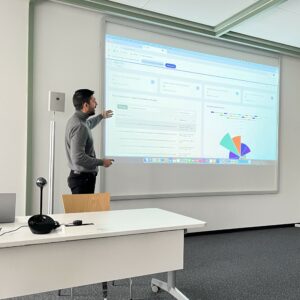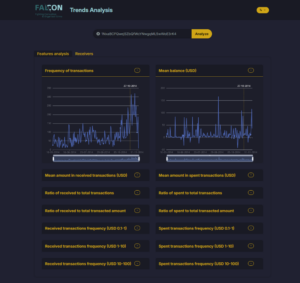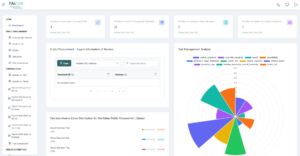 On Wednesday, 29 January, we conducted our first pilot. After a first presentation of the tools at the December plenary (see photo), the LEA partners were now able to test the tools extensively and in a more advanced stage at the pilot event.
On Wednesday, 29 January, we conducted our first pilot. After a first presentation of the tools at the December plenary (see photo), the LEA partners were now able to test the tools extensively and in a more advanced stage at the pilot event.
As the event took place online, all partners were able to participate easily. In break-out rooms, the LEA partners could test all 8 tools developed so far by completing specific tasks. The tool developers were also in the sessions, so any questions that arose could be clarified with them directly.
All in all, the pilot event was very fruitful for both the LEA partners and the tool developers, as can be seen from the voices cited below.
The following tools were tested:
- Investigation for Corruption Cases / FALCON Knowledge Base (ENG)
- Investigation through knowledge graphs created upon the FALCON knowledge base, consisting of nodes and connections between them (e.g. “Person A” knows “Person B”)
- Predictive Analytics tool (CERTH)
- Is designed to assist LEAs in analysing public procurement processes and identifying patterns that may indicate irregularities, such as single bidding scenarios.
- By leveraging data from tenders in different countries, the tool predicts the likelihood of single bidding for a specific procurement lot.
- Trends Analysis tool (CERTH)
- aims at identifying potential trends in heterogeneous data related to corruption phenomena
- In pilot 1, the tool focused on the temporal analysis of the cryptocurrency transactions of a Bitcoin address of interest to monitor its transaction activity over time, provide information on the recipients, and identify moments where significant changes occur.

- OSINT tool (SPH)
- OSINT = Open Source Intelligence, i.e. the use of publicly available data for investigation
- In this tool, data from publicly available websites is evaluated. Sources include news, blogs, PEP lists (PEP = politically exposed person), sanction lists, and EU tenders.
- Kriptosare (Vicomtech)
- analyses behaviours within cryptocurrency networks, like Bitcoin or Litecoin.
- It utilises graph analysis, visual analytics and Artificial Intelligence (AI) techniques to extract information and behavioural insights from cryptocurrency addresses based on the transactions in which they are involved.
- ACRA tool (ICCS)
- offers a proactive approach to identifying and addressing corruption risks in real-time (or near-real-time).
- addresses 4 key use cases: public procurement, company data, border corruption, and the combination of public procurement and company data, and features over 36 indicators across these domains
- empowers users to conduct sophisticated analyses, visualise data intuitively, and gain actionable insights into corruption risks

- Border Corruption Investigation tool (within the ACRA tool) (BPTI)
- uses international transit logs to provide actionable insights into border-crossing activities to enhance border security
- leverages predefined indicators to flag suspicious activities and detect potential criminal networks through data analysis
- Car Visual Recognition tool (CERTH)
- will help evaluate the risk of border corruption
- will analyse video feeds to identify the license plates of cars crossing border control points
Some voices from the participants:
"The pilot was a great success, providing an opportunity to showcase the FALCON dashboard, gather valuable feedback from LEAs, and see firsthand how it can support investigations. The positive engagement and insightful discussions will further guide the platform’s development and improvements."
Marco San Biagio
Engineering Ingegneria Informatica s.p.a. (ENG), tool developer
„The testing of the first online pilot of the FALCON project was a success, showing all the partners involved the advances made in the development of the project tools. On the other hand, the direct interaction between LEAs and the project tools developed in various phases was a success, paving the way for their further development in the direction desired by end users.”
Mircea Mihail Radan
RadExpert (RAD), domain expert
"The 1st pilot event was a well-organised and crucial step for fostering direct interaction between technical partners and end-users in the FALCON project. It showcased that we are on the right path to achieve full interoperability between these two groups, tailoring technology to operational needs and ensuring the best possible outcomes."
Nikos Peppes
Institute of Communication and Computer Systems (ICCS), tool developer
“I think this pilot truly showed that our project is going in the right direction and that our consortium is working hand in hand to make FALCON's goals achievable.”
Charlotte Dürr
French National Police Academy, WP6 task lead and organiser of the pilot event
